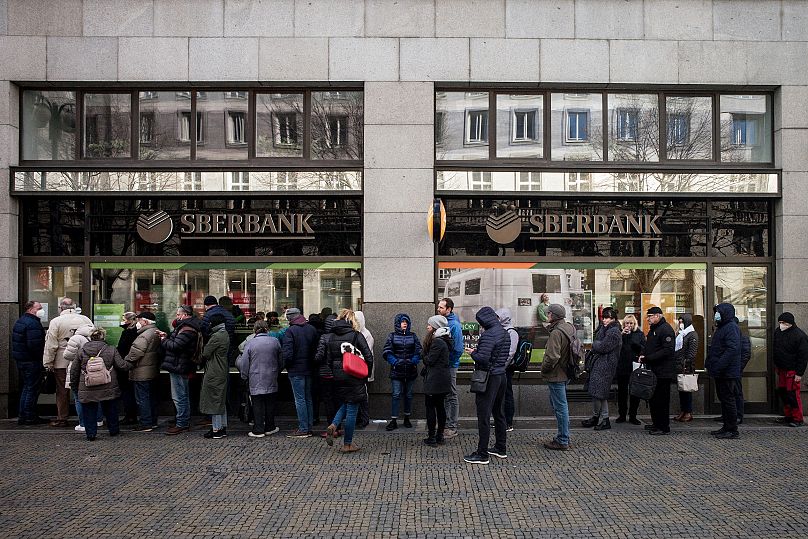The European Commission announced it was stepping up a ban on Russian banks accessing the financial transaction system SWIFT. Here's what it means.
Russia's largest bank will be excluded from the SWIFT payments messaging system, European Commission president Ursula von der Leyen announced on Wednesday.
 ADVERTISEMENT
ADVERTISEMENT
 ADVERTISEMENT
ADVERTISEMENT
Sberbank is among three Russian banks to be sanctioned as part of the European Union's sixth package of sanctions against Russia after it invaded Ukraine in February.
They join VTB Bank, Bank Otkritie, Novikombank, Promsvyazbank, Rossiya Bank, and Sovcombank, as well as VEB - Russia's development bank - on the list of institutions blocked from SWIFT, a system that facilitates cross-border payments.
Wednesday's sanctions announcement also includes an EU ban on a further three Russian state-owned broadcasters and a proposal to end imports of Russian oil by the end of this year.
Ukraine's government had demanded a full ban on Russian access to the international banking system following Russia's invasion of the country.
"I will not be diplomatic on this. Everyone who now doubts whether Russia should be banned from SWIFT has to understand that the blood of innocent Ukrainian men, women and children will be on their hands too. BAN RUSSIA FROM SWIFT," Ukraine's foreign minister Dmytro Kuleba tweeted on February 25, the day after the invasion began.
But what is SWIFT, and what happens when banks lose access to it?
What is SWIFT?
SWIFT, short for the "Society for Worldwide Interbank Financial Telecommunication", is a secure messaging system that facilitates rapid cross-border payments.
Its standardised system of secure messages is highly trusted, and allows banks to process high volumes of transactions very quickly
The Belgium-based system was set up in 1970 as a cooperative made up of the thousands of financial institutions that use it.
It has become the backbone of international finance. In 2020, around 38 million messages were sent each day over the SWIFT platform, according to its Annual Review. Each year, trillions of euros are transferred using the system.
While there are alternatives - for example, Russia and China operate their own systems that work in similar ways - SWIFT is the most used worldwide.
Why does a SWIFT ban matter?
Banning Russian banks from SWIFT makes it much harder for them to access financial markets around the world.
As a result, it would be much more difficult - although not impossible - for Russian businesses and individuals with accounts at the affected banks to import and export goods and borrow and invest abroad.
A ban on Russian banks would not be a world first. Some Iranian banks were barred from SWIFT in 2019 following US sanctions. The country as a whole had its access suspended between 2012 and 2016.
Russia's central bank also sanctioned
Along with pulling access to SWIFT from some of the country's commercial financial institutions, Russia's central bank has also been sanctioned.
The sanctions would prevent the central bank from "deploying its international reserves," the European Commission said, effectively cutting the Russian government off from over $600 billion (€536 billion) of foreign currency reserves.
The impact of the sanctions initially caused the rouble to slide 30 per cent against the US dollar and led the Russian central bank hiked interest rates to 20 per cent in an effort to stave off the risks of depreciation and inflation.
The Russian currency has since recovered to pre-war levels against the dollar.











